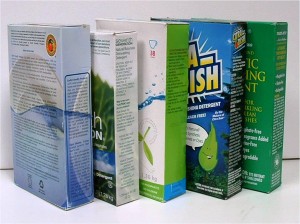Clean Fertilizers, Healthier Lakes and Rivers Legislation – 2011
 OLYMPIA – April 14, 2011, Governor Christine Gregoire signed the “Clean Fertilizers, Healthier Lakes and Rivers” legislation (ESHB 1489) into law. The legislation manages the sale of phosphorus in fertilizers and provides a commonsense and cost effective approach to making sure that our lakes and rivers are clean. This legislation was one of the four environmental community priorities for the 2011 legislative session and the first to be signed into law. The Lands Council nominated it last fall and it was selected as the first priority from an eastern Washington member of the Environmental Priorities Coalition.
OLYMPIA – April 14, 2011, Governor Christine Gregoire signed the “Clean Fertilizers, Healthier Lakes and Rivers” legislation (ESHB 1489) into law. The legislation manages the sale of phosphorus in fertilizers and provides a commonsense and cost effective approach to making sure that our lakes and rivers are clean. This legislation was one of the four environmental community priorities for the 2011 legislative session and the first to be signed into law. The Lands Council nominated it last fall and it was selected as the first priority from an eastern Washington member of the Environmental Priorities Coalition.
When phosphorus in fertilizer washes off of our lawns into lakes, rivers, and Puget Sound, it causes pollution that costs taxpayers and businesses millions of dollars to clean up. Excess phosphorus in our waterways causes rapid growth of weeds and smelly algae blooms that can harm fish, wildlife and public health. Lake Spokane/Spokane River, Lake Whatcom, Lake Vancouver, Lake Washington and hundreds of other waterways across our state are polluted from too much phosphorus.
“This law will provide a commonsense and cost effective approach to fulfilling our responsibility to keep our lakes and rivers clean and healthy for ourselves and our children,” said Mike Petersen, executive director of the Lands Council. “Managing the sale of phosphorus lawn fertilizers will help clean up lakes and rivers across Washington while saving our businesses and local governments money; it’s a win-win for our economy and the environment.”
“We’ve worked hard over the past few years to craft sensible legislation to reduce phosphorus pollution,” said Rick Eichstaedt, with Spokane Riverkeeper. “We are proud to have collaborated with the Environmental Priorities Coalition, Scott’s Miracle-Gro, Washington State Lake Protection Association, Fred Meyer, Washington Retail Association, Avista Corp., Inland Paper Company, the City of Spokane, and dozens of local governments across the state to pass this bill into law.”
Special thanks go to Neil Beaver, Lands Council Board member and part-time lobbyist who spent the last 4 months in Olympia working to pass this legislation. We also applaud Rep. Andy Billig (D-Spokane) for his tremendous leadership on this issue and also commend Senators White (D-Seattle), Brown (D-Spokane), Ranker (D-San Juan Island) and Nelson (D-Maury Island), and Rep. Upthegrove (D- Des Moines) for their important contributions to passing this bill.”
Other Information:
Phosphorus in Lawn Fertilizers White Paper
Phosphorous Free Automatic Dishwasher Detergent – 2010
In a continuing effort to improve water quality in our lakes, rivers, streams, and marine waters, Washington stopped the distribution and sale of dishwasher detergents that contain more than 0.5 percent phosphorus. Because soaps for hand washing dishes were already phosphorus-free, the new requirement applied only to soaps used in automatic dishwashers. The law extended limits already in place for laundry detergent. The Washington Legislature passed the lake-friendly detergent law in 2006 to take effect July 1, 2010.
Governor Gregoire and the legislature imposed the restrictions in Spokane and Whatcom Counties two years earlier because environmental conditions there demanded immediate action. Lake watchers have long known that excess phosphorus acts as a fertilizer, stimulating the growth of algae and other aquatic plants in fresh water. When these plants and organisms die, their decay uses up oxygen, suffocating fish and other aquatic life. Stormwater runoff, septic tanks and wastewater treatment plants send phosphorus into our water from detergents and other products like fertilizers. When household wastewater is sent to a treatment plant, the process removes much, but not all, of the phosphorus before it reaches our rivers, lakes and streams. By reducing phosphorus in household products, we can reduce nutrient pollution and keep our waters and aquatic life healthier. Fifteen other states joined Washington in the move toward lake-friendly detergents in 2010 which were Illinois, Indiana, Maryland, Massachusetts, Michigan, Minnesota, Montana, New Hampshire, Ohio, Oregon, Pennsylvania, Utah, Vermont, Virginia, and Wisconsin. To learn about more lake-friendly actions and ways to protect Washington’s waters, visit www.ecy.wa.gov/washington_waters.
Other Information:
WALPA’s Response to Phosphorus Dishwasher Detergent Ban
WALPA’s “Get the P Out” Press Release



